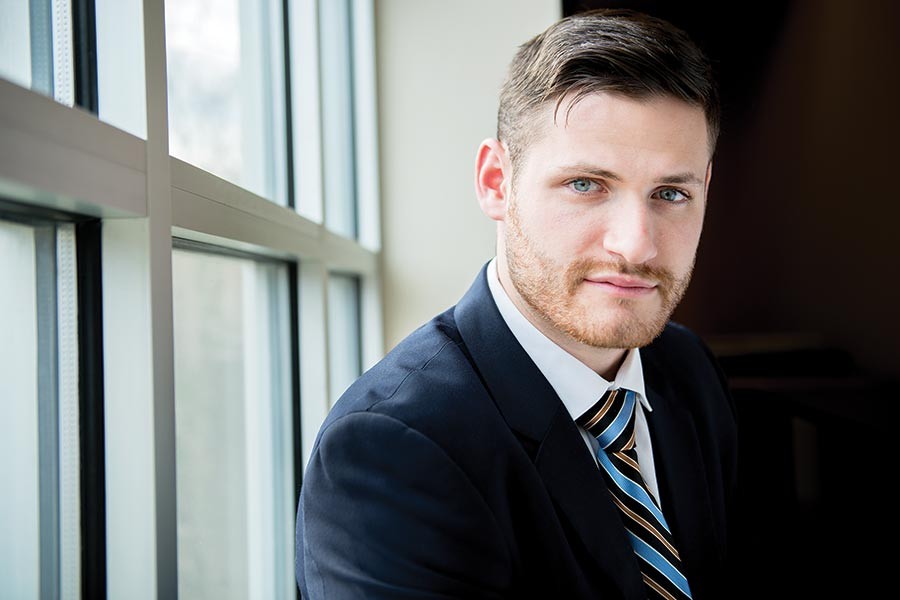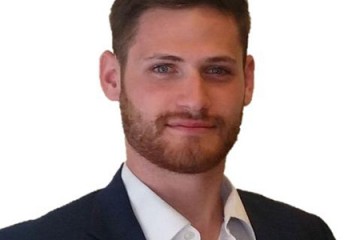Johns Hopkins plastic surgeon Devin O'Brien-Coon had noticed an all-too-common problem among patients recovering after procedures. Blood clots, he explained to classmate David Narrow, are a common side effect of surgery. They're hard to detect and can cause serious problems such as organ failure. Moreover, early diagnosis has been limited because surgeons have no easy way to mark the blood vessels most at risk.
Narrow and O'Brien-Coon, both Engr '13 (MS), designed a novel fix: Before closing up a patient, the surgeon leaves behind a tiny, biodegradable reflector in those key vessels. The reflectors highlight the vessels during the ultrasound, making it easier to scan for clots. The pair called the technology EchoSure and formed a company called Sonavex to market it. Narrow already had experience running a medical technology firm—as an undergrad at the University of Rochester, he founded MonoMano Cycling, which builds customized bikes for stroke victims, veterans, and others who can use only one hand. As CEO of Sonavex, Narrow earned a spot on Forbes' "30 Under 30" list in health care in 2016. Narrow and his team, part of the Johns Hopkins FastForward program, are working to get EchoSure to market.
How did you grow this idea into a business?
We were fortunate to get some initial funding from TEDCO, a Maryland technology booster, which enabled us to refine the technology. I had been working in Boston after graduation and decided to leave my job to spin the EchoSure technology out of the university. (We had initially developed the tech at Johns Hopkins as part of our work in the Center for Bioengineering Innovation and Design.) We got a couple of small grants here and there, and then finally got a really attractive grant from the National Institutes of Health, followed by one from the National Science Foundation. Then we were able to raise some private investment dollars. Bit by bit, we were able to formalize operations to be able to work toward getting FDA clearance for the device.
How did your experience running MonoMano Cycling help you start Sonavex?
That's when I got my first taste of entrepreneurship. We created a solution to enable stroke survivors to return to cycling, got the products manufactured, started an e-commerce business, and got some trikes to the people who really could benefit from them. It's a much simpler company, but I learned about managing expectations. This stuff isn't easy; you have to persevere through the tough times and not get hugely disappointed when things aren't going well.
What's been the scariest moment along the way?
Early on, our initial TEDCO grant was about to run out, and there was really only one other funding opportunity that made sense. We did the presentation and we thought it went super well, but then the question and answer session was brutal. All the experts seemed to be saying they thought our plan was garbage. Before going to the airport, Devin and I had this really depressing lunch in our suits and ties at a Ruby Tuesday by the airport. We thought all hope was gone. And then we found out a couple of weeks later that we got the funding.
How would you describe the life of an entrepreneur?
One day I might be working with my engineering team to refine the technology and the product, another day I'll be pitching to investors, and maybe later that week I'll be in the operating room with Devin performing an animal surgery to actually test the technology. Every day is different, and that fits my personality well. I pour a ton of effort and hours into the job, but it doesn't always feel like work.
What has been the biggest surprise in creating a business?
The operational, legal, and human resources–related components. I underestimated how challenging and critical those components are and how much work they would require. We thought it would be all about doing the research, development, and testing, but there really is a lot that goes into enabling the team to do that work effectively.
As you look back, is there anything you would have done differently?
It took me several months to start shamelessly reaching out to people who were experienced and asking them for advice or favors. What I found was that a lot of people were willing to be helpful, even if I didn't have anything to offer them in return. Asking to buy someone lunch or coffee and pick their brain—and then maybe having them introduce you to someone who could wind up being an investor, collaborator, or potential customer—can really help. I didn't start that early enough.
Why has Sonavex been successful?
We refuse to take no for an answer. When you're doing something new or different or risky, you get a ton of negative feedback saying that you're going to fail. People cite reasonable points such as technical risks, financial risks, regulatory risks, a lack of experience. But we're stubborn—those pieces of negative feedback just motivate our team to work harder and say, 'We will prove that this is possible and we will be successful.'
Posted in Voices+Opinion
Tagged entrepreneurship









